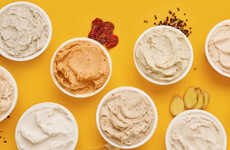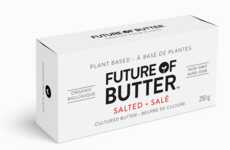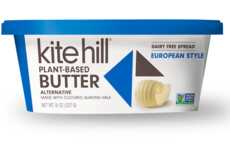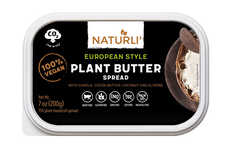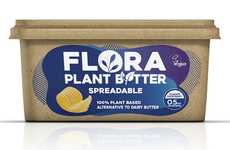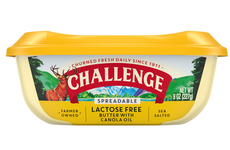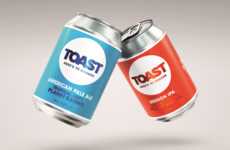
Scientists at Cornell University Discover a New Butter-Like Spread
Grace Mahas — August 23, 2019 — Eco
References: news.cornell.edu & gizmodo
With more consumers opting for plant-based food alternatives, it's never been a better time for food scientists to unveil a new low-calorie butter alternative that's made mostly from water.
The new product is made by emulsifying a small amount of vegetable oil and milk fat with 80 percent water to mimic the texture and taste of butter. It also features beeswax as a stabilizer to further immediate the consistency of real butter. The new butter alternative boasts 25.2 calories and 2.8 grams of fat per tablespoon, a much healthier makeup than the nutritional benefits of traditional butter.
The widespread adoption of this new water-based butter could drastically reduce the nation's dependence on dairy which greatly contributes to climate change in addition to lowering the population's consumption of trans-fat.
The new product is made by emulsifying a small amount of vegetable oil and milk fat with 80 percent water to mimic the texture and taste of butter. It also features beeswax as a stabilizer to further immediate the consistency of real butter. The new butter alternative boasts 25.2 calories and 2.8 grams of fat per tablespoon, a much healthier makeup than the nutritional benefits of traditional butter.
The widespread adoption of this new water-based butter could drastically reduce the nation's dependence on dairy which greatly contributes to climate change in addition to lowering the population's consumption of trans-fat.
Trend Themes
1. Plant-based Food Alternatives - The increasing trend towards plant-based food alternatives creates opportunities for innovative low-calorie butter substitutes.
2. Low-calorie Food Alternatives - The growing demand for low-calorie food products creates opportunities for the development of water-based butter alternatives.
3. Climate-friendly Products - The need for climate-friendly products opens the door for water-based butter alternatives that reduce the nation's dependence on dairy.
Industry Implications
1. Food Science - The food science industry can develop innovative butter substitutes using water-based formulations to cater to health-conscious and environmentally-conscious consumers.
2. Sustainable Agriculture - Sustainable agriculture companies can explore new ways of producing beeswax as a stabilizer to support the production of water-based butter and other low-fat and low-calorie food alternatives.
3. Food Retail - The food retail industry can capitalize on the growing demand for plant-based and low-calorie food products by adopting and promoting water-based butter alternatives and other similar items.
3.8
Score
Popularity
Activity
Freshness


